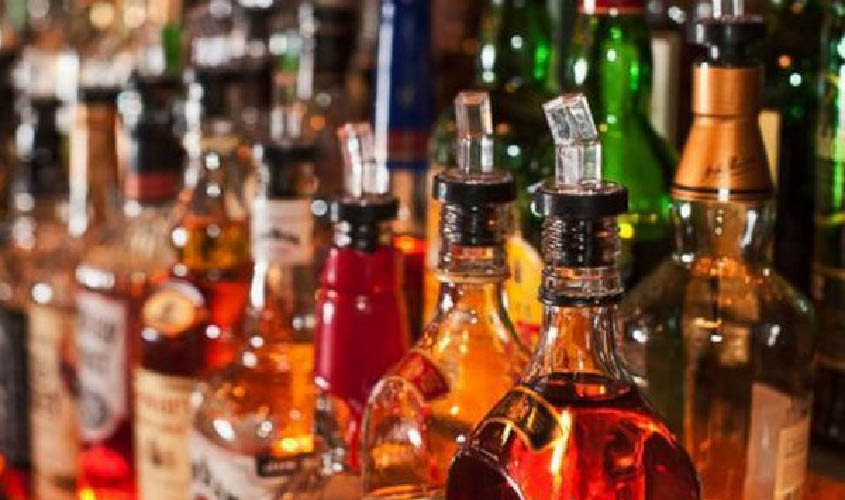HYDERABAD: From 1 January 2020, liquor will be a scarce commodity in Andhra Pradesh as the Jagan Mohan Reddy-led YSR Congress government rolled out is new excise policy for bars and restaurants on Friday. Under this policy, liquor being served in bars and restaurants will be cut down by 40% and taxes will go up and timings will be trimmed. As a result, there will only be 380 bars instead of 798 currently.
However, five and other star hotels are exempted from the new policy as of now. The government is of the view that these star hotels will cater to the needs of tourists and outsiders who can afford the high prices in those places. The government’s policy is to make liquor a scarce commodity as well as a costly thing so that middle classes and the poor would be weaned away from the addiction.
This is in tune with Chief Minister Jagan’s thrust on total prohibition in Andhra in the next four years, which is one of his key election promises to people of the state. Already, the government has reduced the retail liquor outlets by 20% from 1 October. Of the 4,200 wine shops that existed before, the government has cut them down to 3,500 now.
A major change in the wine shops policy, Jagan has abolished the previous method of allotting shops to private persons and handed over the job of selling liquor to the Andhra Pradesh Beverages Corporation, a public sector undertaking. Now, liquor is sold through these outlets from trimmed timings of 11 am to 8 pm, instead of earlier 10 am to 10 pm.
Another major reform is abolition of belt-shops method in Andhra Pradesh. These belt shops are attached to licenced retail outlets and were allowed to sell liquor in villages and remote places by unauthorised persons. The excise department has turned a Nelson’s eye to these belt shops as they contributed to augment their sales revenues.
However, these belt-shops became a nuisance in rural and semi-urban areas as more public places turned into open bars and liquor became available right from 5 am onwards in these areas. Women were much worried over the consequences of the government indirectly promoting these belt-shops and Jagan, who took out a padayatra before elections, promised to abolish them if he came to power.
As per the new policy for 2020-21 excise year announced on Friday, the government has increased licence fee for bars and restaurants substantially. For areas with population of less than 50,000, the fee is Rs 25 lakh per annum, while the same for below five lakh population is Rs 50 lakh and above that population size is Rs 75 lakh.
The existing bar and restaurant licences will be cancelled and the new allotments will be made through lottery. The processing fees and registration and the non-refundable application fee, too, were hiked. Besides, the government has decided to increase taxes on liquor served in bars and restaurants from 1 January, by around 20%.
Already, the liquor sold through retail outlets became costly by 25%, depending on products and brands. An Indian Made Foreign Liquor bottle became costlier by Rs 20 per quarter (25-275 ml), Rs 40 per half bottle and Rs 80 per full bottle. The excise department has been vested with powers to revise the rates from time to time.
The ruling party and the ministers in the government have claimed that these reforms were in tandem with their overall goal of imposing total prohibition before next elections. But, there are concerns over its feasibility and the impact on the exchequer and the other related fields like business and tourism.
Opposition TDP is not openly attacking the government’s policy on restricting liquor sales in Andhra Pradesh, but is questioning the manner in which it is being implemented. TDP MLC and former minister N. Lokesh, son of former Chief Minister Chandrababu Naidu, recently remarked that the cut down in liquor retail outlets and bars would not lead to lesser consumption of alcohol in the state.
The increased taxes in the name of discouraging public from drinking liquor would ultimately impose additional burden on the poor and middle classes, he pointed out. TDP general secretary Varla Ramaiah also wondered whether it would lead to making of illicit liquor which is harmful to people. “Moreover, we will see long queues and black marketing of liquor due to shortage of shops and bars,” he said.
However, AP Information and Public Relations Minister Perni Nani defended the changes in the liquor policy, saying: “Our aim is to discourage people from the bad habit of alcohol consumption and for this, we are following two methods—one to restrict its availability and second, to make it costly so that people would give it up.”

